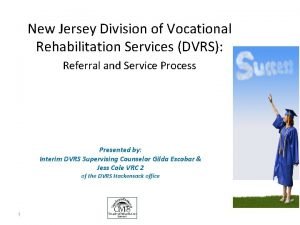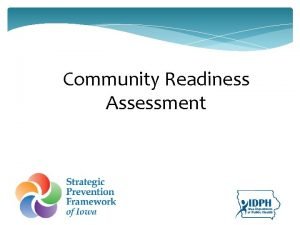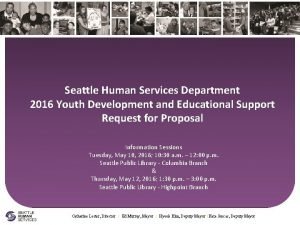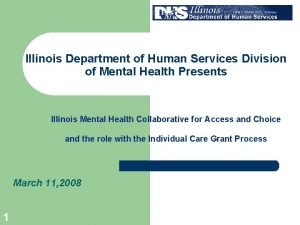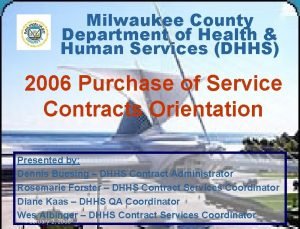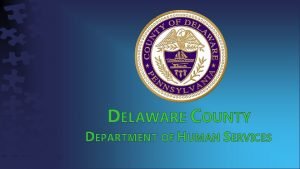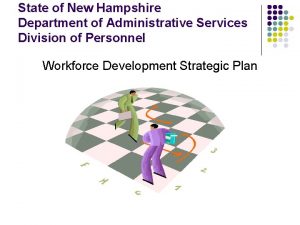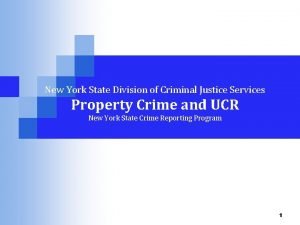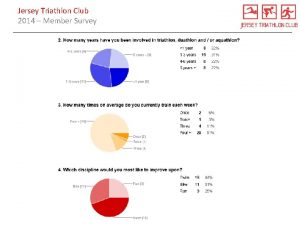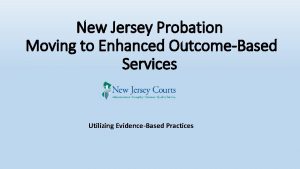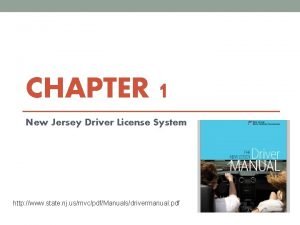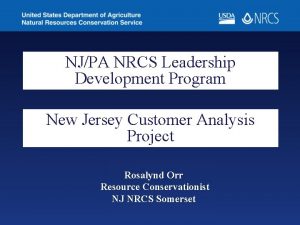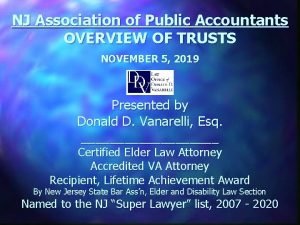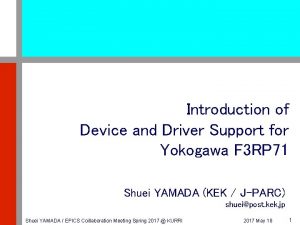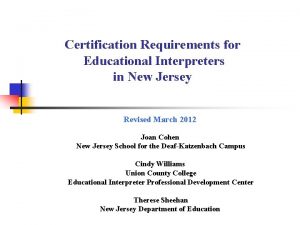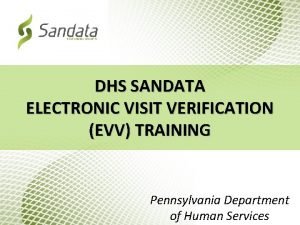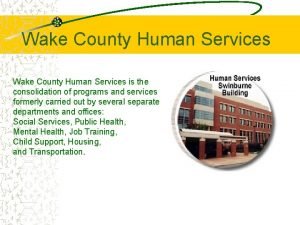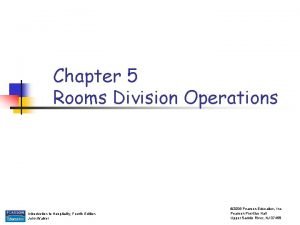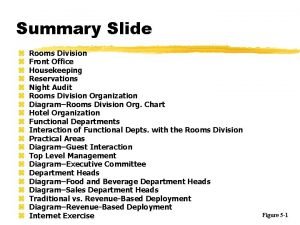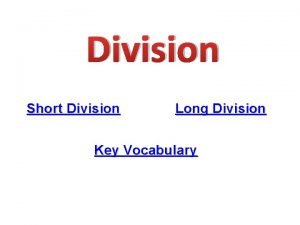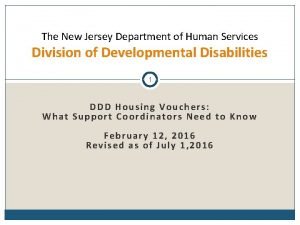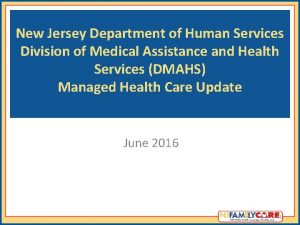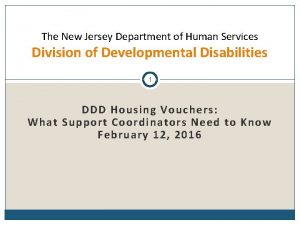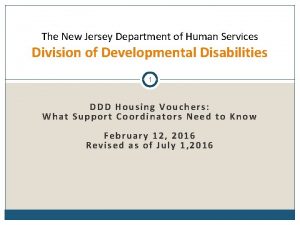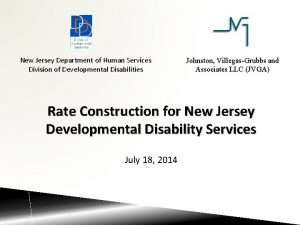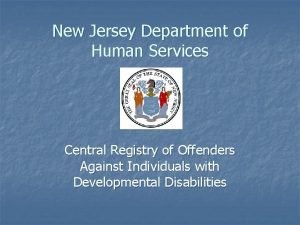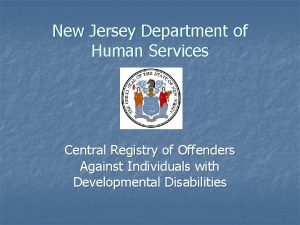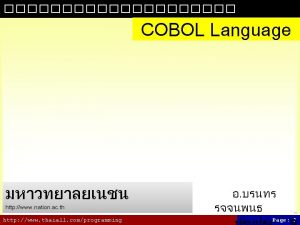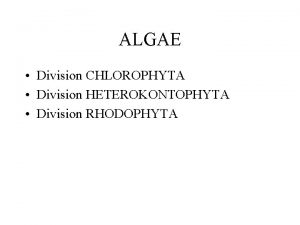The New Jersey Department of Human Services Division




























































- Slides: 60

The New Jersey Department of Human Services Division of Developmental Disabilities 1 Crisis Behavior Resources for Support Coordination

Objectives 2 Ø SC Expectations Ø Define Emergency Ø External Resources Ø Crisis/Behavior Resources Ø Division Resources Ø ICM Referral Process

SC Expectations 3 �Responsible for managing crisis � 24/7 services / On-call �Be supportive to individual & family �Assess situation �Understand the meaning of a true emergency/crisis

Definitions 4 What is considered an Emergency?

Emergency… 5 … means that the eligible person is homeless or in imminent peril.

Homeless… 6 …means that the individual has no place to live or the individual’s living arrangement will end on a certain date within 30 days or he/she has no other living arrangements after that date.

Imminent peril… 7 …means a situation which could reasonably be expected to cause serious risk to the health, safety or welfare of the individual receiving services or another person in the current living arrangement. *Imminent peril does not exist if the Division can put supports into the living arrangement which eliminates the serious risk to the individual

The New Jersey Department of Human Services Division of Developmental Disabilities 8 EXTERNAL RESOURCES

Division of Disability Services (DDS) 9 �Office of Information and Assistance Services �Office of Home and Community Services �Special Projects and Initiatives �Statutory Advisory Boards and Councils Contact Information Telephone: 888 -285 -3036 www. state. nj. us/humanservices/dds

Personal Preference Program (PPP) 10 �PPP offers an alternative way for individuals to receive their Medicaid Personal Care (PCA) services. �Using a monthly allowance, PPP individuals work with a consultant to develop a Cash Management Plan that is used to identify the services needed and the workers/agencies they want to hire to provide the services. �PPP vs. PCA

Personal Preference Program (PPP) 11 PPP allows the individual to: Choose the services they want o Hire people that they know/trust o Schedule services to meet their needs o Exercise greater control over their lives o

Additional PPP Uses 12 Additional possible uses of PPP monthly allowance: Purchasing services from an agency o Making home modifications that increases the individual’s ability to live more independently (i. e. , ramp or chair-lift) o Purchasing equipment, appliances, technology, or other items that increase independence (i. e. , microwave oven or washing machine) o

How to Apply for PPP 13 �Inform families to contact their Medicaid HMO Care Manager to inquire about PPP Services �Division of Disability Services (DDS) Toll Free, 1 -888 -285 -3038, Option 2 Direct, 609 -292 -7800

Adult Protective Services (APS) 14 �APS programs have been established in each county in NJ to receive and investigate reports of suspected abuse, neglect, and exploitation of vulnerable adults living in a community setting. �The purpose of APS is to stabilize a crisis situation using the least intrusive methods while respecting an individual’s rights to self-determination.

Making a Referral to APS 15 �The referral should be made by the person with first- hand information and made directly to the county in which the individual resides. �The referral information should include: Individual’s name, address, phone number o DOB, Social Security number o Diagnoses – medical and/or mental health needs o Family members/support systems (services/agencies involved) o A specific allegation of abuse, neglect, or exploitation o

Limits to APS Services 16 An APS worker is not authorized to: Remove an individual from his or her own home without a court order o Force an individual to accept services o Move an individual to an alternative living situation without his or her agreement or a legal representative’s agreement. o

Unusual Incident Reporting (UIR) 17 �DDD Circular # 14 establishes policies and procedures related to incident reporting. �SCs are required to report suspected or know abuse, neglect, and/or exploitation immediately. �Contact your Regional Office to report any unusual incidents using the phone numbers found on Support Coordinators Guide to Unusual Incident Reporting.

The New Jersey Department of Human Services Division of Developmental Disabilities 18 CRISIS/BEHAVIOR RESOURCES

Community-Based Behavior/Crisis Resources 19 CRISIS ASSESSMENT RESPONSE AND ENHANCED SERVICES (CARES)

CARES 20 �CARES provides services to individuals with a dual diagnosis (Mental Illness and Intellectual/Developmental Disability) �Adult services – 21 years and older �Their goal is to reduce/eliminate the presentation of individuals at mental health screening centers, psychiatric hospitals, and other in-patient services

Mobile Crisis Response 21 Contact Number – 1. 888. 393. 3007 Individuals who have presented at a Mental Health Screening Center in NJ i. iii. Individuals (previously presented at a Mental Health Screening Center) who are in need of follow up Individuals (not presented at a Mental Health Screening Center) but are in a circumstance where they are at risk of presenting

Additional CARES Services 22 �Case follow along for up to 120 days Includes face to face visits with individual and provider/caregiver �Training for crisis screening, agency, and own home caregivers related to how to best address the presenting challenge

Community-Based Behavior/Crisis Resources 23 DEVELOPMENTAL DISABILITIES HEALTH ALLIANCE (DDHA)

DDHA Eligibility Criteria 24 Individuals who: • have been discharged from Developmental Centers to community settings • have been brought back to NJ from other settings • who are at-risk of losing their community living arrangement; and/or • reside in their own home and are in jeopardy of needing an alternate living arrangement

DDHA Program Services 25 Ø Assessments Ø Staff Training Ø On-site Intervention Ø Systems Integration Ø Behavior Skills Training Ø Health Care Services Ø Social Skills Training Ø Mental Health Services Ø Interagency Support & Consultation

DDHA Referral Process 26 �Send a completed Clinical Services Referral Form to: Kenneth Eley 609 -689 -1781 Kenneth. Eley@dhs. state. nj. us *Include the individual's DDD ID # and the phrase “DDHA Referral” in the subject line of the email (i. e. – 123456 DDHA Referral)

DDHA Discharge Criteria 27 • The individual is no longer at risk of institutionalization. • The individual is no longer at risk of loss of placement in a residence, day program or own home. • Appropriate medical, mental health and/or behavioral follow-up is in place. • The identified behaviors and issues have been stabilized and are manageable in the placements.

Community-Based Behavior/Crisis Resources 28 SOCIAL/EDUCATIONAL/ RESIDENTIAL/VOCATIONAL (SERV)

SERV Behavior Specialist 29 SERV Behavior Specialists provide intensive in home behavior support services to DDD individuals residing within the following five counties: • Mercer • Middlesex • Monmouth • Ocean • Hunterdon

Types of Referrals: Mobile Crisis (MCRS) 30 � 4 -week intervention/ Severe Behaviors �Intake/Assessment �Baseline Data/Observation �Skills Training/Treatment Planning �Behavior Plan/Implementation �Outcome Measures/Follow up observation

Types of Referrals: Home-Based(HBS) 31 �Home-Based Referral is an eight week behavioral intervention �Behaviors that warrant a HBS referral are less severe than a MCRS referral �A resource used for skill building and addressing minor behaviors

SERV Referral Process 32 �Crisis Hotline – 609 -240 -3738 �SERV Access Department - Karin Jobe, Access Coordinator - 1 -800 -987 -7378 �For Home-based referrals, send a completed Clinical Services Referral to: Debra Burke 609 -292 -0271 Debra. Burke@dhs. state. nj. us *Include the individual's DDD ID # and the phrase “SERV Referral” in the subject line of the email (i. e. – 123456 SERV Referral)

The New Jersey Department of Human Services Division of Developmental Disabilities 33 CASE STUDY #1

Case Study #1 34 Ryan was recently assigned to your agency. He has a NJCAT score of 2 -level of care, 4 -behavioral, 3 -medical. There is no service plan in place but a home visit is scheduled. You receive a call from Ryan’s caregiver informing you that Ryan has been admitted into the hospital for evaluation. 911 was called due to Ryan and his caregiver getting into an altercation that resulted in Ryan getting burned with hot coffee. Ryan calls you the following afternoon to inform you that he has been discharged and will be staying with a friend for the next few days until things calm down at home. What do you do?

Case Study #1 Suggestions 35 �Complete and submit an UIR �Contact APS �Complete a face to face/home visit �Develop an appropriate service plan �Look into services: DP, PPP, HHA, SE, CARES, DDHA, SERV etc. �Follow up with the hospital’s social worker �Follow up with caregiver �Find out what the result was from the 911 call. Restraining order? Charges pressed? �Obtain contact information for friend �Update case notes and monthly monitoring tools �Read NJCAT for information

The New Jersey Department of Human Services Division of Developmental Disabilities 36 DIVISION RESOURCES

The New Jersey Department of Human Services Division of Developmental Disabilities 37 ACCESSING FAMILY SUPPORT SERVICES

Family Support Service Descriptions 38 DDD evaluates requests for Family Support based on an individual’s need, the services and supports already available, and the availability of DDD resources. Most services are limited and some may not be available in specific geographic locations. RESPITE: Services provided to individuals unable to care for themselves that are furnished on a short term basis because of the absence or need for relief of those persons who normally provide care for the person.

Family Support Service Descriptions 39 �After Work Program: provides activities and assistance with daily living skills at a site based facility typically Monday through Friday between the hours of 2: 30 and 6: 00 pm. �Trained Caregiver: a respite worker trained by the Division who provides in home respite services based on the individual’s needs. �Home Health Aide (Respite): a respite worker trained by a Division contracted entity to provide in home respite services based on the individual’s needs.

Family Support Service Descriptions 40 �Community Care Residence Provider (CCRP): a person licensed to operate a Community Care Residence under N. J. A. C. 10: 44 B. This service provides out of home overnight respite in a Division licensed setting. Depending on the structure of the home and the qualifications of the CCR Provider, individuals who are non-ambulatory, require nursing care, or have other needs can be served in this setting. �Out of Home Respite in an agency setting (overnight or day time): services typically take place at a site based facility or in the community.

Family Support Service Descriptions 41 �In Home Respite through a Contracted Agency: services are provided in the individuals’ home through a DDD contracted provider. �Out of Home Respite at a Hotel: overnight respite services provided in a hotel and based on the individual’s need.

Family Support Service Descriptions 42 Non Respite Services: �Assistive Technology: an item, piece of equipment, or product system that is used to increase, maintain, or improve the functional capabilities of an individual. o Communication devices, mobility aids, computer software �Environmental Modification: physical adaptations to the private residence of the individual or the individual’s family which are necessary to ensure the health, welfare and safety of the individual or to enable the individual to function with greater independence in the home. o Ramps, grab-bars, bathroom modifications, widened doorways

Family Support Service Descriptions 43 �Vehicle Modification: adaptations or alterations to an automobile or van that is the individual’s primary means of transportation in order to accommodate the special needs of the person. o Wheelchair or scooter lift, assist handles, exterior access device controls

Conversation to Assess the Need for Family Support Services 44 All available generic services must be sought prior to requesting services through Family Support �What generic resources are available to support the individual and have those services been fully explored? �Does the individual receive Personal Care Attendant (PCA) Services through Medicaid? These services assist an individual with Activities of Daily Living (ADL). �If so, are the services provided by an agency or the Personal Preference Program (PPP)? PPP allows the individual and family more choice of who provides the necessary care.

Conversation to Assess the Need for Family Support Services 45 �Does the individual have any behavioral or medical needs? �Respite Services: What time periods would be most helpful? Weekend (include time of day) Weekdays (include time of day) In-Home or Out of Home (day time or overnight) �If out of home overnight respite is requested (30 day advanced notice). �Specific dates and limitations on how far the family is willing to travel to drop off the individual at the respite location.

Processing Requests 46 �Once the referral is sent to the provider, it is reviewed to ensure that the provider is able to meet the individual’s needs. If so, the family is contacted by the provider to complete the intake process. DDD is notified by the provider when the service starts or of lack of response from the family. �The Family Support Contact will notify the Support Coordinator of any issues with the referral or when the service is scheduled to start.

How to Make a Request 47 After generic resources have been explored, requests for Family Support Services are made by the family to the Support Coordinator If the requested service is deemed necessary and is available, the Region will complete the referral. The Regional Contact will advise the SC about the status of the referral. SC sends an email outlining the request to the Regional Family Support Contact. The request should include a justification of why the service is needed, PCPT, & NJISP. 30 day advance is needed for all Respite Requests. The Regional Contact reviews the request. Based on the review, additional provider specific documentation may be needed for the SC to obtain.

The New Jersey Department of Human Services Division of Developmental Disabilities 48 COMMUNITY SERVICES

Regional Psychologist Roles 49 �What they do: �What they do not do: Ø Consultation Ø Therapy Attend IDT meetings Ø Input to case management Participate in human rights & behavior management committees Diagnostic evaluations Intelligence & adaptive testing Provide expert testimony in court, when needed Recommendations for supports needed based on psychological needs Ø Ø Ø Ø Group therapy Ø Personality testing Ø Write behavior plans Ø Train or monitor agency staff

How to Access a Regional Psychologist 50 �Send a completed Clinical Services Referral Form to: Adilson Da. Silva 609 -689 -1732 Adilson. Da. Silva@dhs. state. nj. us *Include the individual's DDD ID # and the phrase “Clinical Services Referral” in the subject line of the email (i. e. – 123456 Clinical Services Referral)

Regional Nurse Roles 51 Ø Long Term Care Ø will assess for level of care (decline) and complete required Medicaid paperwork Ø Clinical Services Referral Form Ø will visit upon request for issues not limited to level of care needs, wound issues, current hospitalizations, weight loss, diet, nutrition, etc. Ø Miscellaneous Ø available as resource for medical questions or concerns

How to Access a Regional Nurse 52 �Send a completed Clinical Services Referral Form to: Adilson Da. Silva 609 -689 -1732 Adilson. Da. Silva@dhs. state. nj. us *Include the individual's DDD ID # and the phrase “Clinical Services Referral” in the subject line of the email (i. e. – 123456 Clinical Services Referral)

Request for Intensive Case Management 53 YSupport Coordinator (SC) Reviewed by Michele Elston and/or Mentor Consult with ICM Unit NO Has the assigned SC exhausted all service options? YES Regional/County Intensive Unit Director An intensive CM will visit the individual within 48 business hours

Request for ICM Referral Form 54 Ø Demographic Information Ø Reason for Referral (Out-of-Home Supports, In-Home Supports, Case Consultation) Ø Support Coordination Information Ø Current Services Ø Important Information Ø What prompted referral, Last Home Visit, Barriers, APS, UIR, Services Offered) Ø History of Hospitalizations *NJISP, PCPT, NJCAT, and Written Justification (if applicable) must be included with Referral

Role of Support Coordination 55 Before ICM Referral is submitted After ICM Referral is submitted Communicate with family to confirm what is being requested Connect with the assigned ICM worker; participate in scheduled home visit Explore all service options – think about what can be put in place to safely maintain the individual in the home: Medicaid Funded Services, Family Support, Respite, Behavior Supports, Medical Rule Out, etc. Continue with monthly monitoring; revise service plan as needed Obtain written justification, if applicable Assist with needed follow up (i. e. Family Support requests, change in services, etc. ) Consult with Mentor/Division Staff Ensure a smooth transition to CCW services and Division Case Management for monitoring

Case notes 56 DOCUMENT! • Concise, specific, and non-judgmental • Dated (month, day, and year) • Professionally written with an emphasis on situational facts, accountability, problem solving, plan of action, and results • Up to date

The New Jersey Department of Human Services Division of Developmental Disabilities 57 CASE STUDY #2

Case Study #2 58 Christina was assigned to your agency several months ago. She has a NJCAT score of 2 -level of care, 4 -behavioral, 1 medical. Mom is requesting residential placement due to Christina’s aggressive behaviors and the home being in foreclosure. No services are in place besides day program. Christina’s natural supports have recently changed due to her older brother getting married and moving out. Christina is also in need of a communication device but mom reports that she does not have any money to purchase one. What do you do?

Case Study #2 Suggestions 59 �Research & utilize behavioral resources – DDHA, CARES, SERV �Research & utilize Medicaid services – PPP, HHA, PASP �Follow up on day program / day services �Follow up with family support �Save up SSI funds to purchase a tablet (suggest purchasing a used or refurbished one) �Reach out to County Services to see if they have any resources that can be utilized �Encourage the family to have medications checked by her PCP or psych for a medical rule out �Discuss with family reasons why Christina would not be moving with the family if their home becomes foreclosed �Update case notes and monthly monitoring tools

Thank you! 60 Michele Elston 973 -252 -3464 / 609 -689 -6717 Michele. Ruggiero@dhs. state. nj. us
 Division of rehabilitation services nj
Division of rehabilitation services nj New york, new jersey, pennsylvania, and delaware
New york, new jersey, pennsylvania, and delaware Iowa department of health and human services
Iowa department of health and human services Seattle human services department
Seattle human services department Illinois department of human services
Illinois department of human services Milwaukee health and human services
Milwaukee health and human services Maine department of health and human services
Maine department of health and human services Delaware county human services
Delaware county human services New hampshire department of administrative services
New hampshire department of administrative services Department of criminal justice services ny
Department of criminal justice services ny Universal waste management in new jersey
Universal waste management in new jersey New jersey space grant consortium
New jersey space grant consortium Nj road test parallel parking rules
Nj road test parallel parking rules Appalachian ridge and valley
Appalachian ridge and valley New jersey center for teaching and learning
New jersey center for teaching and learning How many total squares are there
How many total squares are there New jersey board of law examiners
New jersey board of law examiners New jersey accent words
New jersey accent words Jersey tri club
Jersey tri club Nj dyslexia handbook
Nj dyslexia handbook New jersey plan vs virginia plan
New jersey plan vs virginia plan New jersey grants & scholarships 2020-21
New jersey grants & scholarships 2020-21 Getting a driver license illegally may result in
Getting a driver license illegally may result in New jersey social emotional learning standards
New jersey social emotional learning standards New jersey courts
New jersey courts New jersey institute for continuing legal education
New jersey institute for continuing legal education Www.njctl.org answer key
Www.njctl.org answer key Italiani in new jersey
Italiani in new jersey Kelly allen new jersey
Kelly allen new jersey Virginia plan and new jersey plan venn diagram
Virginia plan and new jersey plan venn diagram Drafting of the constitution
Drafting of the constitution Viva new jersey
Viva new jersey Viva new jersey vocabulary
Viva new jersey vocabulary New jersey absolute location
New jersey absolute location New jersey plan
New jersey plan Sea lice new jersey
Sea lice new jersey Chapter 1 the new jersey driver license system answers
Chapter 1 the new jersey driver license system answers New jersey beefsteak tomatoes
New jersey beefsteak tomatoes Are motorized bicycles legal in new jersey
Are motorized bicycles legal in new jersey New jersey science teachers association
New jersey science teachers association Chapter 1 the new jersey driver license system answers
Chapter 1 the new jersey driver license system answers Flood dream ocean city new jersey 1971
Flood dream ocean city new jersey 1971 Leadership development new jersey
Leadership development new jersey New jersey association of public accountants
New jersey association of public accountants Nj yokogawa
Nj yokogawa New jersey interpreters
New jersey interpreters New jersey vs tlo
New jersey vs tlo Ossur new jersey
Ossur new jersey Ramapo eof
Ramapo eof Richard hackney
Richard hackney Sandata evv training
Sandata evv training Wake county human services community services center
Wake county human services community services center Department vs division
Department vs division Office of academics and transformation
Office of academics and transformation Department vs division
Department vs division Imf
Imf Organizational structure of room division
Organizational structure of room division Room division department
Room division department Short division vs long division
Short division vs long division Synthetic division method
Synthetic division method Long division vocab
Long division vocab
